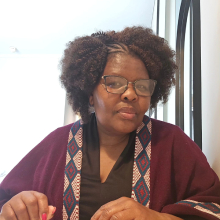Programs
- M. Tech. in Automotive Engineering -Postgraduate
- Master of Physician Associate (M.PA) – (Medicine, Surgery) 2 Year -Postgraduate

UNESCO Chairholder on African Heritage Studies and Sustainable Development, University of Botswana
Qualifications
BA Humanities (Archeology and Environmental Science), University of Botswana, Botswana
Post Graduate Diploma in Education (Geography and History), University of Botswana, Botswana
MPhil in Archaeological Heritage and Museums, University of Cambridge, England, UK
PhD in Archaeological heritage conservation and sustainable development, University of Cambridge, England
Dr Susan O. Keitumetse is an international scholar and heritage expert whose multi-disciplinary background that encompass Archaeology, Environmental sciences, Museums and Education has enabled her to mainstream heritage issues in a multi-sectoral, trans-disciplinary, multi-stakeholder perspective over time. Her PhD thesis (2005), Sustainable development and cultural heritage management in Botswana: Towards sustainable communities, University of Cambridge, UK, is one of the leading scholarships to link the sustainable development policy framework with the field of world cultural heritage, a topic that has since gained momentum within UNESCO circles.
With a view to catalyze the linkage between cultural heritage and the broader environmental resources conservation in Africa, Dr Keitumetse has focused on sustainable development as an anchoring principle for this endeavour. Her expansive international publication record illustrates this well
Her research on sustainable development has also extended to how African cultural heritage in particular can benefit production and consumption of knowledge in a way that will enable African knowledge to be an active player in the global discourse and innovation.
Amongst her many works she is the author of the book; African Cultural Heritage Conservation and Management: Theory and Practice from Southern Africa: Springer (2016), a book that places African heritage scholarship within an international context.
She is also the lead editor of the book: Sustainability in developing countries: Case studies from Botswana’s journey towards 2030 (2020), a book that showcases academic publishing’s ability to act as a tool to report on the African SDG achievements.
Dr Keitumetse has both national and international experience. She has won grants from international institutions that have enabled her to be a player at the international level. For example, Cambridge Commonwealth Trust, Cambridge Livingstone Trust grants(to study for Mphil and PhD at the University of Cambirdge, UK); Rockefeller Foundation Fellowship award as a research fellow at the Smithsonian Institution, Washington DC, USA; the Watson Scholar Fellowship at Brown University in Rhode Island, USA and the Wenner-Gren Foundation, USA research grant amongst others. She has also served as an associate editor of the journal Environment, Development, and Sustainability journal published by Springer amongst other current and international review roles.
Dr Keitumetse has worked and continues to work with UNESCO where she has been engaged as an expert advisor, examiner, juror, facilitator, and consultant within the various UNESCO culture and education sectors. She is currently a UNESCO Chairholder on African Heritage Studies and Sustainable Development at the University of Botswana where she is currently a research scholar in cultural heritage, tourism and sustainable development.
Her overall research interests are in the areas of exploring and illustating how various forms of cultural heritage enable a sustainable conservation of the environment, and lead to inclusion of social systems and communal cultural identities in most African world heritage landscapes.
For a long time, African heritage landscapes have been branded for tourism (country economic) purposes, spoken of in terms of GDPs and ROIs to governments. However, with the enlightenment that comes with sustainable conservation, questions of community identities and community benefits are now surfacing. Communities around protected areas, in particular, Africa’s safari branded landscapes are beginning to question their ancestral connections to the landscapes, and whether there is a new found way to re-connect in a more meaningful way that just the economic. Similarly, policy implementers are also beginning to assess how they can curb conflicts surrounding land use of these protected areas. Heritage, as a vehicle of societal identity stands a chance to provide potential solutions to this conundrum.
This presentation assesses and discusses ways through which incorporation of heritage attribute can result in reformed conservation approaches that can be used not only to re-connect society with otherwise “people drained protected environments”, but also be used as a vehicle to curb and ameliorate conflics of land use surrounding some of Africa’s contested heritage landscapes. Within UNESCO statistics African nature sites form the majority of “sites in danger”, pointing a pattern surrounding “people drained” protected environments…..